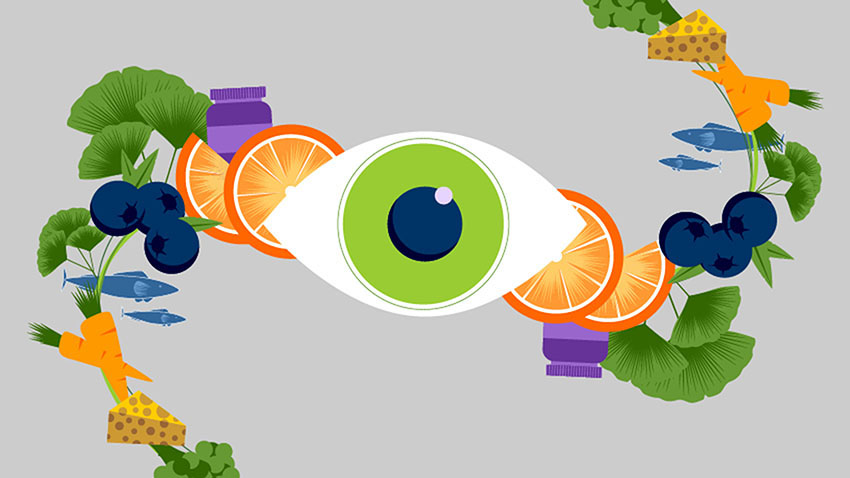Vitamins for eye health are not rare or hard to pick from the market shelves. However, today’s fast-food dining lifestyle is creating a deficiency of such nutrients in your meal plan. Good eyesight comes from proper eye care and a good nutritious meal plan. Here are the top vitamins and other nutrients to add to your plate for the sake of your eyes.
Avoid macular degeneration with vitamins for eye health
Vitamin E is very helpful in reducing the progression of this disease. This condition is an age-related one, which leads to blurred or lack of vision in the center of your visual field. Thus, vitamin E is essential in middle-aged and senior individuals. Among the vitamins for eye health, Vitamin E is one with the least number of sources, yet it is not rare to find. Top foods to add to your plate are almond butter, wheat germ, avocado, sunflower seeds, pumpkin, spinach, beet greens, bell peppers, and more.
The antioxidant vitamins for eye health
Top vitamins for eye health improvement are Vitamin A, C, and E. Most of the sources of these vitamins are rich in antioxidants too. Vitamin A helps in reducing the risk of night blindness. Chicken liver, dairy, milk, egg, apples, and many other sources are rich in this vitamin. Vitamin C is rich in citrus fruits, peppers, broccoli, and more. We already saw the sources of Vitamin E in the last section. Beyond these, it is also best to add Zinc to your plate by including shellfish, pork, beef, peanuts, and chocolate.
The sunshine vitamin for eye health
Vitamin D helps to avoid many age-related optical conditions. The deficiency of vitamin D can lead to macular degeneration, dry eye, and uveitis. Calcium deficiency can cause serious problems in the body, including the increase in the risk of cataracts. Vitamin D helps to improve the absorption of calcium from the food. The top vitamin D sources are sesame seeds, brazil nut, pumpkin seed, avocado, leafy vegetables, fish, and more. However, it is the sunshine vitamin, and your skin needs sunshine to generate this vitamin.
The vitamin for eye health and optic nerve protection
Vitamin K is one of the lesser-known vitamins for eye health. Vitamin K deficiency can lead to serious eye problems, including glaucoma-induced nerve damage. There are 14 different types of Vitamin K components, and Vitamin K2 is essential for eye health. Vitamin K2 helps in gaining healthy retinal ganglion cells, sclera, and other nerves. It also balances the ocular pressure and promotes circulation. The gut bacteria in the body build vitamin K2. However, you can also intake vitamin K2 by adding dairy products, liver, meat, soybean, etc. Vitamin K is rich in kale, parsley, broccoli, Brussels sprout, turnip greens, Swiss chard, fish, meat, liver, egg, and cabbage.
More reasons to why vitamin A is essential
Vitamin A helps in maintaining a healthy cornea. It is also helpful in producing rhodopsin. Rhodopsin is an eye protein that helps you have good rods vision (ability to see in low light conditions). In addition, prolonged deficiency in vitamin A can lead to cornea softness, which leads to complete blindness.
Vitamins for eye health –B6, B12, and B9
These three vitamins perform a similar action for eye health. These help to lower the level of homocysteine in the body. Homocysteine is responsible for inflammation. Inflammation can lead to macular degeneration. Vitamin B6 is rich in peanuts, fish, turkey, banana, oats, and pork. Add liver, seafood, beans, spinach, and sunflower seeds to get B9. B12 is rich in egg, cheese, fish, meat, clams, liver, and more.
Reduce oxidative stress with vitamin B2
Vitamin B2, or Riboflavin, is helpful in reducing oxidative stress. It prevents the occurrence of cataracts. An individual needs just 1.3mg of riboflavin every day. Top sources of vitamin B2 are yogurt, cereals, oats, milk, and beef.
Improve optical nerve health with Niacin
Niacin or Vitamin B3 is responsible for optic nerve health. The vitamin also reduces the risk of glaucoma. According to doctors, people tend to consume supplements for vitamin B3, which is not a good choice. In the case of vitamin B2 deficiency, supplements are essential, but the dose is very crucial. Overconsumption of B2 can lead to macular damage, blurred vision, and cornea inflammation.
The recommended dose is 1.5 to 5 g per day, and it changes with other criteria like age, underlying medical conditions, and more. Thus, it is better to stick with natural sources like legumes, turkey, fish, soy, dairy products, mushroom, and chicken.
Thiamine and the eye health
Vitamin B1, also called Thiamine, can reduce the risk of cataract by 40%. It is also helpful in reducing eye-related problems in individuals with diabetes. A prolonged deficiency of Thiamine can lead to blurry vision and optic nerve swelling. In addition, severe Thiamine deficiency can also lead to loss of vision. Thiamine is rich in cooked lentils, raw macadamia nuts, beef liver, black beans, and asparagus.
Supplements for vitamins – good or bad
When there is a deficiency, the only option to regain the vitamin level is choosing vitamin supplements. A healthy person would derive little to no benefits from supplements. Moreover, too much vitamin supplement consumption can lead to other related or unrelated conditions in some cases. The type of supplements also depends on the medications currently consumed, medical history, major organ diseases, and more. In short, the best way to consume supplements is with a doctor’s approval. Talk to your doctor about the eye problems you are facing, and he would recommend the right supplements if needed.
In short, a balanced diet and a healthy lifestyle are essential to maintain eye health. Those above 30 years of age should take up annual eye checkups to identify any conditions as early as possible. Remember that these vitamins do not replace any medicines you are consuming for the wellness of your eyes.
